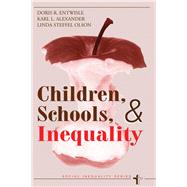Educational sociologists have paid relatively little attention to children in middle childhood (ages 6 to 12), whereas developmental psychologists have emphasized factors internal to the child much more than the social contexts in explaining children's development. Children, Schools, and Inequalityredresses that imbalance. It examines elementary school outcomes (e.g., test scores, grades, retention rates) in light of the socioeconomic variation in schools and neighborhoods, the organizational patterns across elementary schools, and the ways in which family structure intersects with children's school performance. Adding data from the Baltimore Beginning School Study to information culled from the fields of sociology, child development, and education, this book suggests why the gap between the school achievement of poor children and those who are better off has been so difficult to close. Doris Enwistle, Karl Alexander, and Linda Olson show why the first-grade transition--how children negotiate entry into full-time schooling--is a crucial period. They also show that events over that time have repercussions that echo throughout children's entire school careers. Currently the only study of this life transition to cover a comprehensive sample and to suggest straightforward remedies for urban schools, Children, Schools, and Inequalitycan inform educators, practitioners, and policymakers, as well as researchers in the sociology of education and child development.
Doris R. Entwisle and Karl L. Alexander are professors of sociology, both at Johns Hopkins University. Linda Steffel Olson is senior research assistant in the Department of Sociology at Johns Hopkins University. Doris R. Entwisle and Karl L. Alexander are professors of sociology, both at Johns Hopkins University. Linda Steffel Olson is senior research assistant in the Department of Sociology at Johns Hopkins University.


